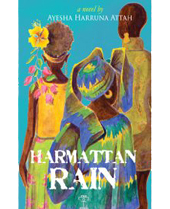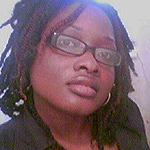Harmattan Rain is the debut novel by US based-Ghanaian
author Ayesha Harruna Attah. The story spans three generations
of Ghanaian women, from the years shortly before Independence right
up to the turn of the 21st century. The book starts
with Lizzie-Achiaa fleeing from her village and domineering father,
with hopes of eloping with her first love and becoming a nurse in
Accra. The next 400-plus pages chronicle the ups and downs, lives
and loves of Lizzie, her implacable daughter Akua-Afriyie and grand-daughter
Sugri.
The premise of Harmattan Rain
is a promising one but the execution fails to live up to the potential.
The novel gets off to a fairly auspicious start. It is initially
well paced and somewhat engaging but it soon loses its way. It
is not too long before Attah’s tell-tale rookie mistakes start
to manifest themselves. Much of the book screams 'unimpressive
first novel'. From the oft-horrendous editing and typos that litter
the text, to the author’s insistence on stating the obvious
and ignoring the subtleties of subtext. Plot progression is formulaic
and predictable. I found myself disengaged from most of the ill-developed
characters with not enough reasons for me to really care about them.
The dialogue often lacks credibility
and sounds too much like something out of a poorly-written US TV-show.
Even the cadence of the language is more American-English than West
African. This works well in the latter parts of the book when Sugri
is studying in New York. Elsewhere, it seems more like Attah has
lived in America for too long and might have forgotten the nuances
of the English language as spoken on the West African Coast. There
are plenty of stereotypes floating around too... Afrocentric Americans,
lazy gatemen, hypocritical men of God.
One of the novel’s main weaknesses
is that the author cannot seem to decide whether she wants the story
or the characters in the book to take centre stage. The narrative
is far too frequently bogged down with pointless detail, and characterisation
is often sacrificed at the altar of plot convenience. For instance
when Lizzie runs away from home everything goes a little too smoothly.
There are none of the delays or opposition one would expect to encounter
in real-life – a truculent mother-in-law notwithstanding.
She is taken in by a convent, which magically pull some strings
that eventually lead to her going to nursing school, where she becomes
best friends with the first girl she meets, going on to marry a
promising young businessman she meets at the hospital where she
works.
The characters and their relationships
are mostly one-dimensional. We are told by the author that Lizzie
and daughter Akua-Afriyie have a strained relationship and the latter
estranges herself from her mother. Yet we never really come to
understand what caused such a monumental breakdown in the relationship.
True, Lizzie is not all that supportive when Akua-Afriyie becomes
pregnant, yet the author wants us to believe the breakdown started
long before then. I wish Attah would have spent more time exploring
this relationship and less time detailing the colour and fabric
of the clothes the characters are wearing or the Feng-Shui of their
living rooms. In fact Akua-Afriyie often comes across as whimsical
and unreasonable, dragging her apparently beloved father, Ernest,
into the feud with her mother for no ostensible reason. She manages
to shut him out of her life for several years as well.
Attah often has her characters doing
or saying things that are neither true-to-life nor consistent with
the people she wants us to believe they are. Below is an extract
from when Akua-Afriyie first sees her father after her self-imposed
hiatus...
‘Eh Afriyie! Is this where you’ve been hiding?’...
‘Papa, how are you?’
‘Can’t complain, Afriyie. Ghana is difficult but somehow we’re surviving’
‘Papa, how come you never come and visit me?’
she asked.
‘I was told you weren’t seeing any visitors’
he said ‘How’s my granddaughter?’
‘She’s fine. You should see her. She’s
this tall...’
After 5 years of Akua not seeing her
father, not even after the birth of her child, I find this casual,
devoid-of-awkwardness conversation, hard to swallow.
In another section of the novel, when
Akua-Afriyie’s long campaign to bed her Pastor ends in humiliation
she questions why God didn’t warn her that trying to seduce
a clergyman was a bad idea. This to me is a classic example of
the several occasions where this book administers a slap to the
face of the intelligent reader. There are also plenty of incidental
characters who I suppose are meant to enrich the tapestry of the
story. Instead Attah lacks the dexterity to bring them to life
and they are more like irritating interruptions. The ending of
the novel is disappointingly abrupt. I wouldn’t have minded
this so much if the novel had not been quite so long.
I would argue that the main strength
of ‘Harmattan Rain’ is its in-depth exploration of Ghana’s
political evolution since the pre-Independence 1950’s. In
this way it serves as a useful introduction to the country’s
recent political history. I even suspect the book was an excuse
for Attah to wax-lyrical on what she thinks of the various civilian
governments and military administrations that have been in power.
She’s clearly no fan of Jerry Rawlings. Attah doesn’t
manage to weave these political discussions as seamlessly into the
novel as she might have intended and some of the discourse reads
more like a ‘Let’s talk about political history’
lesson. Nonetheless the information has some educational value
and the novel succeeds on this front even if it doesn’t on
so many others.
Harmattan Rain is not the
strongest of debut novels. It is not altogether terrible and there
are segments that are quite readable. Yet considering that the
writing isn’t generally up to par it is far too long, making
it a laborious read at times. On more than one occasion, I felt
the time it took to finish the novel could have been better spent.
However if you have the patience and are looking for undemanding
African chick-lit, with some critique on politics thrown in, ‘Harmattan
Rain’ would suffice.
2 out of 5. 
|











![]()
![]()


